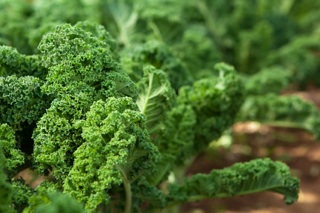-
Kale is a member of the cabbage family. It is a leafy green vegetable also known as Borecole. There are several different varieties of kale: Popular varieties include “Curly”, “Dino” (also known as Lacinato), “Red Russian”, “Premier” to name a few.
- Let’s take a look at the health benefits of kale.
-
It is part of the cruciferous vegetable family, which are all well known as potent natural multi-vitamins.
- One cup of kale contains 33 calories and 9% of the daily value of calcium, 206% of vitamin A, 134% of vitamin C, and a staggering 684% of vitamin K. It is also a great source of minerals copper, potassium, iron, manganese, and phosphorus.
- Antioxidant rich:
- Kale is an excellent source of two powerful antioxidants called carotenoids and flavonoids. According to researchers it may contain up to 45 different flavonoids. These antioxidants protect our bodies from harmful oxidative stress, which has been linked to many diseases including cancer.
- Of the carotenoids, lutein and beta-carotene are very high in kale.
- Within the flavonoids, kaempferol and quercitin make the top of the list.
- Anti-inflammatory:
- One thing that makes kale so unique is its high levels of omega-3 fatty acids. Omega-3s have potent anti-inflammatory effects. Kale’s flavonoids have both antioxidant and anti-inflammatory benefits, and for this reason have anti-cancer properties.
Cancer prevention:
- Kale is packed with antioxidants and anti-inflammatory agents that help fight cancer. Like all cruciferous vegetables, kale is also a great source of glucosinolates which according to a study by the German Cancer Research Center helps prevent many types of cancers.
- Detoxification:
- Kale contains isothiocyanates, which are believed to help the body with the detoxification process.
- Happy heart:
- In addition to the heart healthy antioxidants and omega-3s, kale is also an excellent source of fiber, which is known to help lower cholesterol. According to the American Heart Association, high cholesterol is one of the main factors for heart disease, stroke, and heart attack.
- Vitamin A:
- Kale contains an incredible 192% of the recommended daily value for vitamin A in one cup, so a little goes a long way. Vitamin A is an antioxidant, which strengthens the immune system, and helps promote healthy teeth and bones.
- Vitamin C:
- One cup of kale contains a whopping 88% of the recommended daily value for vitamin C, which is an immune boosting antioxidant.
- Vitamin K:
- Kale has an unbelievable amount of vitamin K, at 1327% of the recommended daily value in just one cup. Vitamin K helps fight conditions related to inflammation like autoimmune disorders, arthritis, and asthma.
- How to use kale:
- It can be eaten raw or cooked. Add it to soups, smoothies or salads.
- Massage the raw leaves for a few minutes to make your kale taste a little sweeter and feel softer.
- To get the cholesterol fighting benefits it is recommended to cook or steam it.
- For an ovarian health drink with kale.
- For a liver cleanse recipe with kale.
- Note: None of the information in our website is intended to diagnose, treat, cure or prevent any illness or disease. The content on our website is for educational purposes only.
- REFERENCES:
- 1. Ramsey, M.D., Drew. “This Is Your Brain on Kale.” The Huffington Post. TheHuffingtonPost.com, 02 July 2013. Web. 05 July 2013.
- 2. “Dietary Glucosinolate Intake and Risk of Prostate Cancer in the EPIC-Heidelberg Cohort Study.” National Center for Biotechnology Information. U.S. National Library of Medicine, 01 Nov. 2009. Web. 05 July 2013.
- 3. “Why Cholesterol Matters.” American Heart Association. American Heart Association, 10 Dec. 2012. Web. 05 July 2013.

















